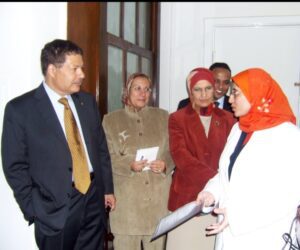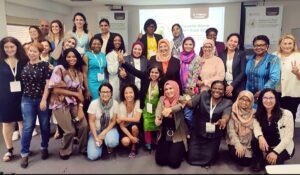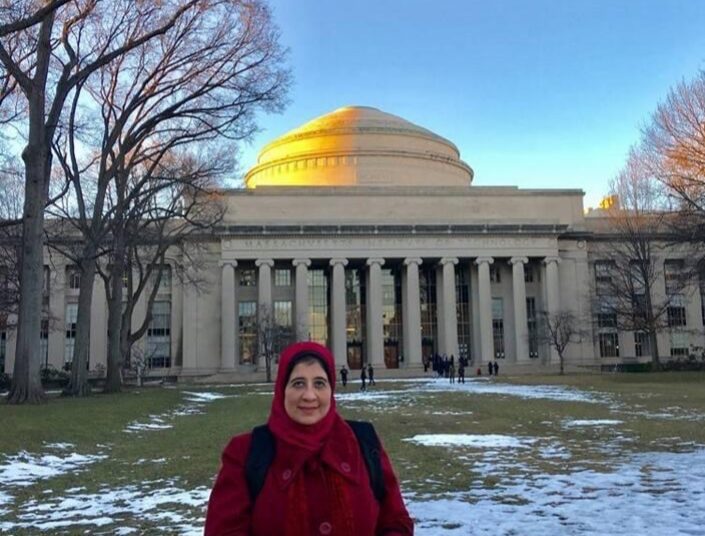If there’s anything the pandemic has made clear, it’s that the crucial role of scientific research can’t be overlooked in today’s world. It is amazing to see how the impact of women in science in particular has grown exponentially, leading to better science in general.
An Egyptian scientist has managed to make headlines thanks to her unique scientific achievements coupled with her genuine zeal to support women in science worldwide and breathe new life into the so-called science communication.

The Egyptian Mail sat with the Amal Amin, who shared her reflections on her personal experience as a woman scaling the heights of science. Her commitment to creating a more inclusive world in science has helped her to blaze trail for all women who take science as their career path.
Dr Amal Amin, founding chair of Women in Science without Borders (WISWB), was the first Egyptian young scientist who attended World Economic Forum-Summer (WEF), DAVOS 2009.
She attended and co-organised the founding workshop of global young academy (GYA) in Berlin (2010) to become one of the few active founders of GYA and its executive committee member for the following three years after foundation (GYA 2010-2013). She was also founding group leader of women in science (WIS), member in science advice group and the selection committee of GYA.
“I joined several high-level projects and talked at prestigious reputable events which qualified me to monitor the situation of women in science in several parts of the world where several programs and fund dedicated to women in science but still there is problem related to (women in science) where I personally hate that term which based on classification where we are all scientist,” she added.

Dr Amin is associate professor at National Research Centre (NRC)-Egypt and she was group leader of the nano-structured polymers at the centre of excellence. She earned her B.Sc. in chemistry from Ain Shams University and her M.Sc. in organic chemistry from Cairo University. With a DAAD scholarship/Egypt joint fund at Ulm University, Germany/Cairo University, she earned her Ph.D. in polymer technology and catalysis.
Since then, she has occupied different positions as visiting professor at nanotechnology program-faculty of engineering-Cairo University. Research stays brought her to France, USA and again to Germany for several times. She supervised and headed several international, national projects, postgraduate students and other activities.
She carried out two memorandums of understanding between Egypt, Georgia and MTU-USA. She has lots of scientific publications in highly ranked journals and acts as reviewer and referee in nanotechnology, polymers and nano-composites for international journals and organisations.
Throughout her career, Amin has been keen on developing the total society with science by launching complete initiative including men and women from all sectors to share together in developing society with science in presence of partners from industry, NGOs and the media.

“This way, all will gather for bigger aim, namely sustainable development of societies by cooperation and integration,” she noted. So, it is good chance to stop isolation of scientists inside labs away from the problems of their societies, she stressed.
Dr Amin visited more than thirty countries where she organised and attended numerous national, international events/conferences worldwide. She was invited to tens of high-level meetings as TWAS-TYAN conference (Brazil, 2017, science diplomacy), NASAC international forum on women and sustainable development (Tanzania, 2018), youth employment (Turkey, 2018), renewable energy (Argentine, 2018), INGSA (Japan, 2018), Globlics (Ghana, 2018), and AAAS meeting (Boston, USA, 2017).
As for WISWB initiative, Amin said it is science-based community- building initiative, seeking to begin to connect people and societies with science with more involvement of scientists into societies for the sake of sustainable development. The main slogan for the initiative is (science for sustainable development) with variable themes around (science for all-science diplomacy and others).
Dr Amin was also appointed to act as a panel member of students’ selection committee with the Pan African University Institute of Life and Earth Sciences (Including Health and Agriculture; 2020 & 2021). In 2022, she was appointed as member of board of directors for ORCID (2022-2024). Amin was also the founder and president for the Egyptian society for advanced materials and nanotechnology.
In December 2020, she cofounded Northern African Research and Innovation Management Association (NARIMA) initiative. She is also a founder for science diplomacy for the future initiative (2021).
Her career journey was also filled with many awards. For instance, In 2021, she received outstanding women in tech award of Africa-north Africa (Africa) and the award of science by women provided by women for Africa foundation (Spain).
“I am super interested in science communication, simplified science, increasing public awareness/literacy for science, science advice/science diplomacy, innovation, science policy, science education, etc. , I recommend establishment of special programs for science communication to increase qualifications of scientists especially the young generation in this field.”






Discussion about this post